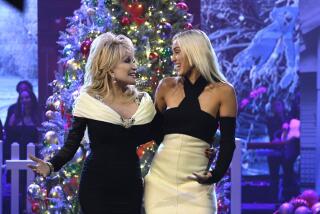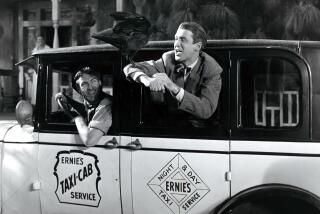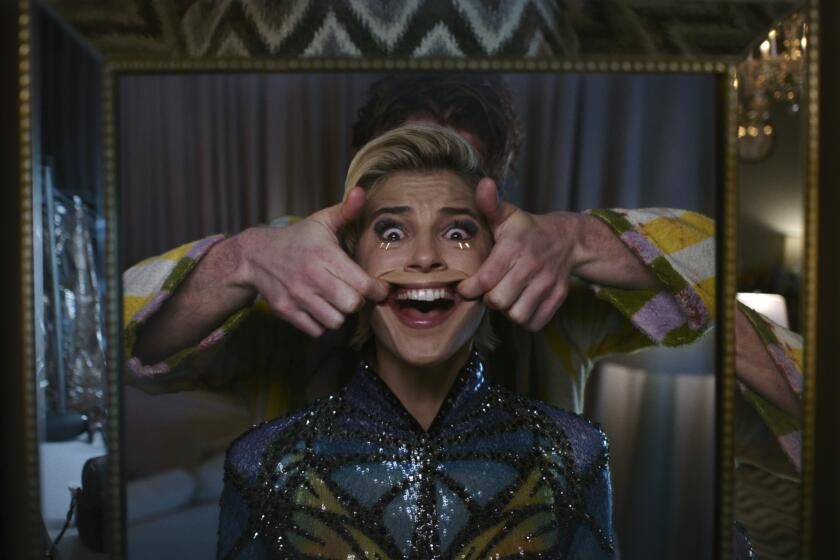MOVIE REVIEWS : ‘Scrooged’ a Mean-Spirited Holiday Satire
“Scrooged” (citywide) is Dickens’ “A Christmas Carol” transposed to modern times and to the cutthroat world of network television. Actually it’s not a bad notion for a satiric comedy and this one begins well, but then veers entirely out of hand until it’s as over-inflated as its own Ghost of Christmas Yet to Come and as funny as a mugging.
Scrooge is now Bill Murray’s Frank Cross, the youngest network president in the history of television, the dumbest and probably the nastiest. In the film’s high point, its opening few minutes, writers Mitch Glazer and Michael O’Donoghue have a lovely time previewing the Christmas lineup there at the IBC network, including “Robert Goulet’s Cajun Christmas” and “The Night the Reindeer Died,” at the hands of North Pole terrorists.
But the reeeeeeelly big show will be a live version of “A Christmas Carol,” with Buddy Hackett as Scrooge and Mary Lou Retton, flip-flopping her way into the audience’s heart as Tiny Tim.
The sheer, awful possibility of it all is what gives this skit its horrible fascination, but a skit is exactly what it is, the kind that Glazer and O’Donoghue honed to merciless perfection on “Saturday Night Live.” When you notice that the “Scroogettes,” are actually the Solid Gold Dancers of beloved memory, you know that attention was being paid all around. (Wayne Finkelman did the costumes, some of the bawdiest, funniest in years.)
“Scrooged” is a mass of sharp, well-deserved paper cuts, beginning with the portrait of Murray, a television mogul whose entire body of knowledge and references to life have come from the Golden Age of television, and worse. There’s Robert Mitchum’s Preston Rhinelander, chairman of the network, who has insider information that cats and dogs are beginning to watch television. All he wants is to have characters sprinkled here and there, to take advantage of that information breakthrough: “A cop who dangles string.” You know.
But these nifty details never expand into a smooth-moving whole; the laughs become sporadic, the undertone nastier and nastier. It bottoms out with a supposed moment of hilarity when Murray mistakes a man on fire for Richard Pryor, a scene made worse when you remember that Pryor and director Richard Donner once worked together, on “The Toy.”
You’ll find a king’s ransom of fine actors sprinkled throughout the movie: John Glover as a blond, suntanned breath of threat from the West Coast, poaching on Murray’s territory; Michael J. Pollard and Anne Ramsey as denizens of a shelter for the homeless; John Houseman as the mellifluous program host; John Forsythe as what amounts to Marley’s ghost. Wasted, all wasted, some of them under circumstances that make you squirm for them.
“Scrooged” also seems like a misreading of the qualities on which Murray built his career: the hipster’s put-on, the pious mien covering deep insincerity. Frank Cross isn’t insincere; he’s really and truly a heartless, friendless, useless fleck of pond scum. Wrong reading, guys.
Since the framework of Dickens’ original hasn’t been altered, and Murray will have to convince us that his final regeneration is from the heart, things get even muddier. Now we have to believe Murray as earnest, sincere and completely reformed, while at any minute we expect him to roll his eyes upward and let us in on the gag: He’s scum to the end. Audiences haven’t had this much trouble with Murray since “The Razor’s Edge.”
You’ll recognize the plot: Tightfisted, workaholic Murray has ruined any personal plans his employees might have had left for Christmas. That includes his executive secretary, Grace Cooley (Alfre Woodard, in the film’s one completely persuasive performance), whose very young son has been mute since his father’s sudden death, and a young executive (Bobcat Goldthwait), whom Murray summarily fires for contradicting him.
Murray is still visited by the regulation three spirits who try to dissuade him from his present path: David Johansen, a true taxi driver from hell, is the Ghost of Christmas Past, taking him to his abused, TV-dominated childhood and through his meeting and budding love affair with the idealistic Karen Allen. (Allen has got to start demanding roles that don’t define her as one long simpering glow. Enough!)
The Ghost of Christmas Present is “Scrooged’s” one Christmas present: Carol Kane, using Billie Burke’s eensie-wee voice from “The Wizard of Oz” and the methods of a defensive lineman for the Buffalo Bills. Watching the fragile, gossamer-winged Kane wallop the stuffing out of Murray, as she pummels him from place to place is strangely satisfying, until even this joke sputters and dies.
Before we must endure the rehabilitated and magnanimous Murray, “Scrooged” becomes its own version of “The Night the Reindeer Died,” with a machine-gun happy Bobcat Goldthwait shooting up the studio and holding the network censor hostage. This indoor equivalent of the careening car chase is a sign of just how hysterically out of control the film has become, a cartooned terrorist act of its own.
‘SCROOGED’
A Paramount release of an Art Linson production in association with Mirage Prods. Producer Richard Donner, Linson. Executive producer Steve Roth. Co-producer Ray Hartwick. Director Donner. Screenplay Mitch Glazer, Michael O’Donoghue. Camera Michael Chapman. Editors Fredric Steinkamp, William Steinkamp. Music Danny Elfman. Costumes Wayne Finkelman. Production design J. Michael Riva; art direction Virginia L. Randolph, Thomas Warren; set design William J. Teegarden, Nancy Patton, Dianne Wager. Sound Willie Burton, Al Mian (N.Y.). Special makeup effects Thomas R. Burman, Bari Dreiband-Burman. With Bill Murray, Karen Allen, John Forsythe, John Glover, Bobcat Goldthwait, David Johansen, Carol Kane, Robert Mitchum, Alfrie Woodard, Michael J. Pollard, Nicholas Phillips, Mabel King, Jamie Farr, Robert Goulet, Buddy Hackett, John Houseman, Lee Majors, Pat McCormick, Mary Lou Retton.
Running time: 1 hour, 41 minutes.
MPAA-rated: PG-13 (parents strongly cautioned; some material may be inappropriate for children under 13).
More to Read
Only good movies
Get the Indie Focus newsletter, Mark Olsen's weekly guide to the world of cinema.
You may occasionally receive promotional content from the Los Angeles Times.










